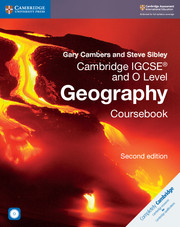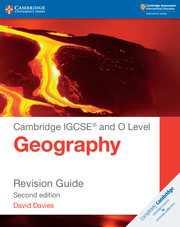Cambridge IGCSE™ and O Level Geography Digital Coursebook (2 Years)
Overview
Filled with sources, graphs and case studies, the coursebook requires students to examine a range of information, helping to build their analytical skills. Written by highly experienced authors and Cambridge trainers, this coursebook is updated to support both Cambridge IGCSE and O Level students. It includes clear and practical support, case studies from 25 different countries, fieldwork ideas and a range of interesting content. The accompanying CD-ROM contains support sheets for the topics covered, outline maps and sample exam-style questions. Answers to the activities are in the teacher's resource.
Features
- 50 up-to-date case studies from 25 countries, including many with Cambridge International centres.
- A range of attractive content, including over 400 illustrations, helps capture and keep students’ imagination.
- Each spread of the book amounts to one lesson, making content easy to follow because information is all in one place.
- Fieldwork ideas for theoretical and practical use.
- Full coverage of the Cambridge IGCSE and O Level Geography syllabuses.
- The accompanying CD-ROM contains over 40 support sheets for use with topics in the coursebook, and over 30 sample exam-style questions on geographical themes with marking schemes.
Contents
- Part A. Geographical Themes: World map
- Theme 1. Population and Settlement:
- 1. World population increase
- 2. Over-population and under-population
- Case Study. Over-population–Nigeria
- Case Study. Under-population–Australia
- 3. Causes of a change in population size
- 4. Population change
- Case Study. High rate of natural population growth–Niger
- Case Study. Population decline–Russia
- 5. Population policies
- 6. Population migration
- 7. The impacts of migration
- Case Study. An international migration–Qatar
- 8. Finding out about the population
- Case Study. A country with high dependency–Italy
- 9. Factors influencing population density
- Case Study. High population density–Japan
- Case Study. Low population density–Namibia
- 10. Settlement patterns
- 11. Settlement sites, growth and functions
- 12. Settlement hierarchy
- Case Study. Settlement and service provision in Sardinia
- 13. Urban land use
- 14. Urban problems and solutions
- Case Study. An urban area–Atlanta
- 15. Rapid urban growth
- 16. Impacts of urban growth
- Case Study. Urbanisation in Peru–Lima
- Exam-style questions
- Global Theme 1. HIV/AIDS
- Theme 2. The Natural Environment:
- 17. Types and features of earthquakes and volcanoes
- 18. Plate tectonics
- 19. Causes and effects of earthquakes and volcanoes
- 20. Volcanoes present hazards and opportunities
- 21. Reducing the impacts
- Case Study: An earthquake–Haiti
- Case Study. A volcano–Mount Sinabung
- 22. Rivers and drainage basins
- 23. The work of rivers
- 24. River landforms 1
- 25. River landforms 2
- 26. Rivers–hazards and opportunities
- 27. Managing river flooding
- Case Study. The Elbe River
- 28. The work of the sea
- 29. Coastal landforms created by erosion
- 30. Coastal landforms created by deposition
- 31. Coral reefs and mangrove swamps
- 32. Hazards and opportunities
- 33. Managing coastal erosion
- Case Study. An area of coastline–Mauritius
- 34. Collecting weather data 1
- 35. Collecting weather data 2
- 36. Using weather data
- 37. Using weather and climate data
- 38. The equatorial climate
- 39. Tropical rainforest ecosystems
- 40. Rainforest deforestation
- Case Study. The tropical rainforest–Ecuador
- 41. Hot desert climates
- 42. Hot desert ecosystems
- Case Study. A hot desert–the Sahara and Mali
- Exam-style questions
- Global Theme 2. Reducing Carbon Emissions
- Theme 3. Economic Development:
- 43. Indicators of development
- 44. Identifying inequalities
- 45. Classifying production
- 46. Employment structure varies
- 47. Globalisation
- Case Study. A trans-national corporation–Nokia
- 48. Agricultural systems
- Case Study. An arable farm in Lincolnshire
- 49. Food shortages
- Case Study. Food shortages in Darfur, Sudan
- 50. Industrial systems
- 51. Industrial location
- Case Study. The Pakistan steel complex at Pipri
- 52. The growth of tourism
- 53. The benefits and disadvantages of tourism
- 54. Managing Tourism for sustainability
- Case Study. An area where tourism is important–Dubai, UAE
- 55. Energy use varies
- 56. Nuclear power or renewables
- Case Study. Energy supply in Iceland
- 57. Using water
- 58. Managing water
- Case Study. Water supply in Lesotho
- 59. Economic activities pose threats
- 60. Managing sustainable development
- 61. Conserving natural resources
- Case Study. Fracking in California
- Exam-style questions
- Global Theme 3. Reduce, reuse, recycle
- Part B. Geographical Skills:
- 1. 1:50 000 Monsefu, Peru
- 2. 1:50 000 Harare, Zimbabwe
- 3. 1:25 000 North York Moors, UK
- 4. 1:25 000 Montego Bay, Jamaica
- 5. 1:25 000 Negara, Indonesia
- 6. 1:50 000 Leicester, UK
- Exam-style questions
- Map skills checklist
- Part C. Geographic Enquiry: Fieldwork skills examinations
- 1. Investigating the CBD
- 2. Investigating rivers
- 3. Investigating tourism
- 4. Investigating weather
- Fieldwork checklist
- The alternatives to coursework
- Exam-style question 1
- Exam-style question 2
- Part D. Preparing for Examinations: Geographical themes: Case studies
- Geographical skills
- Alternative to coursework/Geographical investigation
- Resource
Brighter Thinking Blog
Keep up to date with the latest classroom tips and educational trends from our brighter thinkers.
Visit the blogCatalogues and Ordering
Looking for something in particular or just browsing? View our catalogues to see our full range of print and digital books.
View and downloadAdvice on useful tools
Advice on useful tools, activities and timetabling from teachers experiencing school closures.
Cambridge GO
All our supporting resources have now moved to Cambridge GO – the new home for your Cambridge digital content.
Listen to our podcast
Listen to our podcast to discover teaching inspiration & advice from leading educational thinkers.






